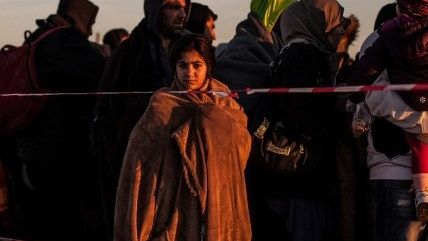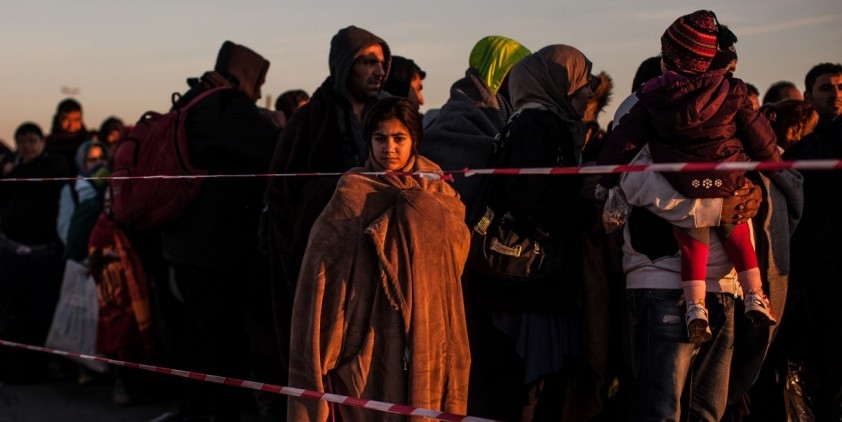Exodus Delves into the Horrible Life of Refugees
Survival above all things.


Frontline: Exodus. PBS. Tuesday, December 27, 9 p.m.
Meet Isra'a, whose young life as a connoisseur of fine toys was rudely interrupted by a missile that obliterated the fine Syrian home of her merchant father. Now she's a canny street kid in the Turkish harbor town of Izmir, where her expertise includes one of the world's oddest niche markets—an open-air plaza where refugee families like hers can purchase all the appurtenances of illicit sea travel.
Over there, she gestures, are the dealers in "rubber rings"—inner tubes, which are used as life preservers by upscale refugees and as vehicles by those whose hopes are bigger than their wallets. The rubber-ring trade is only for the hardiest of entrepreneurs, Isra'a observes, since cops periodically sweep through and confiscate their stocks in hopes of discouraging refugee traffic. (Isra'a, though only 10 or 12, knows a good bit about the police; she laughs as other kids admiringly describe how she shouted at them to run when cops recently grabbed her and slapped her around.)
Less noticeable and therefore less risky, she advises, is the trade in small plastic bags that close with drawstrings: a waterproof carrying case for the cell phones that even the poorest emigres carry to map their trips and call for help in case of sinking, abduction or the other routine imperilments of refugee life. "If, God forbid, the dinghy sinks," Isra'a explains, "the phone will be safe." About the fate of the people carrying the phone, she is silent.
Isra'a one of a dozen or so refugees whose journeys are chronicled in Exodus, a sweeping yet intimate episode of the PBS documentary series Frontline. From passengers frantically bailing water out of a floundering boat in the Mediterranean to a riot inside the notorious Calais camp known as "The Jungle," footage shot by the refugees themselves with smartphone cameras turns Exodus into something more like a diary than a documentary.
Their message is that they are not so different than the rest of us would be if confronted with their dire circumstances. "Anyone can be a refugee," muses Ahmad, a young Syrian man who spent months slipping across borders in the Middle East and Europe in order to reach England after ISIS took over his village. "It's not something you choose. It's something that happens to you."
The refugees are among more than a million who smuggled themselves into Europe from Africa, Asia, and the Middle East during 2015. The flow is even heavier this year as Syria disintegrates into total chaos, from which most of the refugees in Exodus are bolting. ("A country that's thousands of years old was destroyed in a minute," mourns one.)
But as a young man named Sadiq, fleeing a resurgent Taliban in Afghanistan, reminds us, the ceaseless wars of the 21st century have left behind many burned-out hellholes in which the only reasonable alternative is escape. "I'm sure if they had the money, nobody would remain in Afghanistan," says Sadiq as he makes his way toward his personal vision of Utopia, Finland. "Afghanistan would be empty."
How unlivable these ruined countries are is underlined again and again by the fact that not a single of the refugees profiled in Exodus ever turned back, despite enduring kidnappings, beatings, thefts, hunger, and extortions. When their fellow man wasn't using them as a punching bag, the Earth itself took over: treacherous seas, scorching deserts, sucking mud flats.
But don't be misled; this is no tale of indefatigable pluckiness. Even the success stories among the refugees are half-mad before their travel ends. "I survived ISIS, I survived beheadings, I survived Assad," declares one Syrian refugee, nearing hysteria after yet another of his attempts to conclude his journey by crossing the English Channel falls to pieces. "I survived shellings, I survived the sea, I survived everything." To wind up in a squalid French refugee camp, it appears.
Exodus is chock-a-block with harrowing scenes: Sixty people, jammed into a boat generously estimated to have a capacity of 30, trying to save themselves by bailing water with plastic soda bottles. Three Syrian men who've slipped into a parked French cargo truck, assuming it will be loaded onto a ferry for Great Britain, find themselves locked inside it for three days without moving. Or the wrenching despair of a Gambian family as they get a telephoned ransom demand for a son snatched off the street while awaiting passage from Libya to Italy. "Government forces, militias, who knows?" says an uncle in a crushed monotone. "What does it matter?"
Even so, the documentary may be at its best as it explores the peculiar little community that has grown up among refugees. On Facebook pages, they exchange travel tips—everything from the going rate on a fake Czech passport in France ($4,300, and a free plane ticket to England as a bonus if you act now!) to the most reliable no-questions-asked boat dealers in Turkey. In staging areas, they forge friendships so profound that a family that makes a breakthrough on travel arrangements may even offer to take along children of those still waiting.
Striving to humanize its subjects rather than assess blame, Exodus has next to nothing in the way of political content. About the closest it comes is one refugee's urging others to "put religion aside, humanity is more important." Yet it's precisely the failure of some refugees to do that which has clouded the issue of their status in Europe.
Whether they're under the command and control of ISIS or simply draw on it as an inspiration, there's no question that some have revealed terrorist suicide vests under refugee sheep's clothing once reaching their destination. And glib talk of the statistical insignificance of the numbers of terrorists among the refugees will be of scant comfort to the families of those who died in the Berlin Christmas market earlier this week. The failure to confront the question of terrorism leaves a gaping hole in Exodus.
Even so, it's nice to have a reminder, amid all the tough talk about big beautiful walls these days, that refugees are not numbers or political symbols but real human beings facing crushing losses. Even the exuberant little Isra'a starts to crack long before her family reaches its destination of Germany. When the family stops to rest after an endless trek along a frozen, muddy, Serbian road following a bus breakdown, her father asks, "How are you now? Better?" Tears trickle, lips tremble, but words don't come.


Show Comments (46)